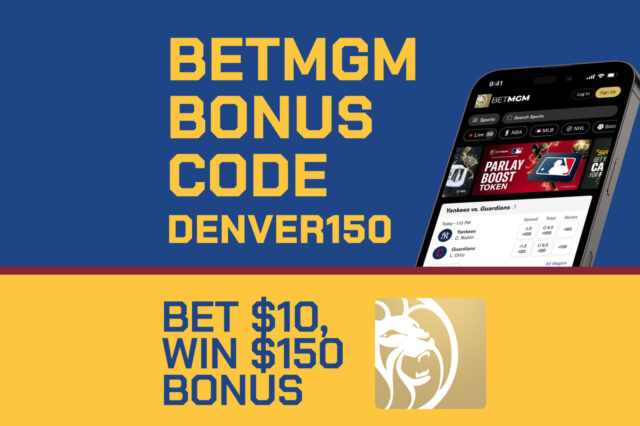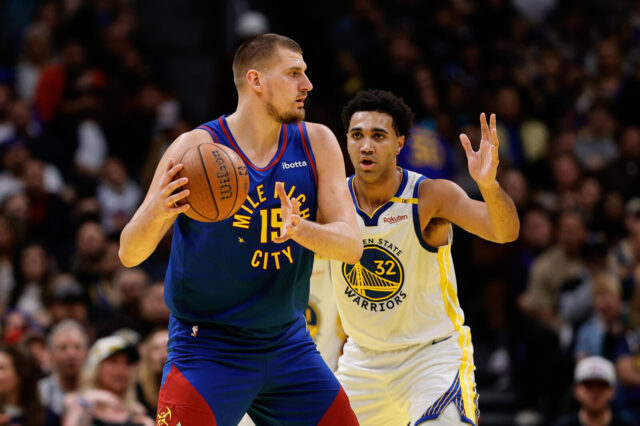I’ll never forget the feeling around town on the afternoon of June 26th, 2003. There was a buzz that often would be felt regarding the Denver Broncos when they were in they heyday of John Elway and Terrell Davis’ back to back Super Bowl run. That sort of excitement where you could feel something BIG was about to happen and the fever pitch takes hold of the entire city, hell the entire state. It’s like in October of 2007 where suddenly every person in Colorado was wearing a Colorado Rockies hat. Those buzzes were built on results though. The Broncos had practically owned a three year period in the NFL, the Rockies were in the midst of a 21-1 run that brought them to the World Series. This was different, this buzz was about a 19 year old kid who had never played a game in professional sports. This buzz was about Carmelo Anthony.
One of the worst kept secrets in the week leading up to the draft was that the Detroit Pistons were, inexplicably, going to take Darko Milicic number two overall despite Melo being fresh off dominating the NCAA as a freshman on the way to leading Syracuse to its only NCAA Tournament Championship. Melo was so good, so iconic in his one year of basketball at ‘Cuse that they named the practice facility after him just six years later. He probably goes #1 overall in about 95% of drafts, but just so happened to be in the same draft as LeBron James and the Pistons just so happened to lose their minds. So, in Denver people hurried home from work to watch the NBA draft (unheard of in this town) and local sports stations blasted out “Mellow Yellow” by Donovan as the entire state prepared for what they knew was coming: the return of Nuggets basketball.
That’s really where the legacy discussion in regards to the Nuggets should start. Carmelo Anthony saved basketball in Denver as we know it. Now, it’s important to note the Nuggets weren’t going to up and leave town because that was part of the deal when Stan Kroenke took over. At the time of purchase he agreed to keep the Nuggets and Colorado Avalanche in Colorado until 2025 as a condition of the deal (Kroenke Sports & Entertaiment this year agreed to commit to the Nuggets and Avs in Colorado until 2040). However, the Nuggets were also the laughing stock of Denver sports, which is saying something given how bad the Rockies were in the early 2000s. While the Broncos and Avs had been winning championships, the Nuggets were abysmal and never more so than when they wrapped up the 2002-2003 season with a whopping seventeen wins. The Nuggets hadn’t had a winning season since the iconic 93-94 team that upset the Seattle Supersonics. That all changed with Melo.
The Nuggets improved their win total by twenty-six games in Melo’s rookie season. They had a winning record, they made the playoffs. Anthony led the way as a rookie. He averaged twenty-one points and six rebounds, he was the clear reason for their success. He got snubbed at the All-Star game and lost out to the national popularity of LeBron James in Rookie of the Year voting, but he had brought back the excitement. That was never more clear to me than the day after Christmas in 2003. NBA circles were in a frenzy about James who had a strong December and just wrapped up a 34 point performance on national TV on Christmas day. The following day the Nuggets faced the Yao Ming/Steve Francis Houston Rockets. It would take until the 8 second mark of the fourth quarter for Denver to get a lead in that game but it was enough. They won by one point and behind what was at the time a career high 37 points from Melo. More importantly, for perhaps the first time in the history of the Pepsi Center, raucous chants of “Let’s Go Nuggets” broke out on the escalators leaving the arena and carried all the way to the parking lot. It was clear that this 19 year old kid had brought basketball excitement back to Denver.
Did he do it alone? Of course not. Marcus Camby and Nene were in tow from the previous year’s Antonio McDyess trade, the Nuggets brought on Andre Miller and Earl Boykins a week or so after drafting Melo. They added pieces around him to make a competent roster. Make no mistake though, that team doesn’t get much higher than the seventeen win total of the previous year without Melo. He stirred the drink that year and he always stirred the drink every year after that whether it was Miller, or Allen Iverson or Chauncey Billups feeding him the ball. While Denver was in a perpetual big rotation of figuring out which of two of the three of Nene, Camby and Kenyon Martin were going to be healthy, Melo was the rock for the Nuggets roster for the better part of a decade. A rock that the rest of the team leaned on while he carried them to seven straight playoff births.
Of course, that’s when the legacy gets muddled. End this story right here and people who lived in a cave in the 2000s are wondering why the hell Melo’s legacy would be complicated. For all the regular season success, there wasn’t much in the way of post season success. Denver made it past the first round just once and shortly thereafter everything came crashing down for the Nuggets/Melo era. However, how much of that is really to blame on Carmelo? The first round struggles are shared and were even continued by coach George Karl after Melo’s departure. There has been a lot said about Karl and his inability to connect with his players during his time in Denver, particularly with Anthony and Martin. There is also the simple fact of the matter that the Carmelo Nuggets happened to co-exist in a time and conference with the Kobe Bryant Los Angeles Lakers and Tim Duncan San Antonio Spurs. Those two teams are in fact responsible for four of the seven series defeats Denver suffered during Melo’s tenure. The other three are the Minnesota Timberwolves during Melo’s rookie year, the Los Angeles Clippers where the team imploded under Karl’s leadership (Martin would end up benched entirely by series end) and the Utah Jazz when the Nuggets had lost both Karl and Nene for the year due to cancer.
This content is no longer available.
As unfulfilling as it was, the simple fact of the matter is Melo was generally never playing with a roster that could compete with their post season opponents and the one time he did have one he took them within two wins of an NBA Finals birth. Of course, that’s the other big asterisk on Anthony’s Nuggets legacy. Denver finally got him all the right pieces, they ran into some incredible bad luck the following season and Melo bounced. He didn’t do it cleanly either. It started with an extension that just went unsigned over the summer of 2010, then a comment made by Chris Paul at Melo’s wedding in New York about forming their own super team with the New York Knicks and ultimately with a request to be traded and a list of potential teams he would sign with long term that was essentially one: the Knicks. For Melo’s part he never outright ruled out the New Jersey Nets who were actively pursuing a trade with Denver and that allowed the Nuggets to have some leverage against the Knicks and ultimately get one of the best superstar trade packages the NBA has ever seen. Still, Melo forced him way out when the Nuggets wanted him to stay long term, it drug out for months, and that soured a lot of fans.
Perhaps if Denver was a bottom of the barrel team or if the Knicks were a piece like Melo away from being a dynasty it would have been different but none of that was the case. The Knicks were abysmal, they hadn’t had a winning season since the turn of the century and were every bit of a mess under James Dolan’s leadership then as they are today. They also gutted their roster to get Melo and Billups. It was far too clear that Melo’s desire to leave the Nuggets for New York was more about personal brand and market than it was about basketball and that stung the Nuggets fan base. It’s like being dumped not because you did something wrong or aren’t a good person, but because that train wreck of a person you got dumped for has an undeserved reputation and is well connected. Being told you’re not good enough cuts deep no matter the walk of life. Being told you’re not good enough because of things entirely out of your control, that’ll make you angry.
This content is no longer available.
Nine years later and it’s apparent plenty of people are still upset about it but perhaps it’s time to let all that go. Ironically, just when Melo is going to what is arguably the Nuggets current biggest rival it is perhaps the best time to start forgiving the way he left and remembering what he gave while he was here. Carmelo Anthony, in my book, is one of the three best Nuggets of all time. Personally I’d have him third, behind Dan Issell and Alex English and ahead of David Thompson, Fat Lever and Nikola Jokic. You can shuffle those names around a bit and if you’re really stretching you could maybe put Melo as the sixth greatest Nugget of all time, but there’s no argument to put him lower than that. For a franchise with 50+ years of history, the idea that a top five player (and, yes, arguably the greatest ever) doesn’t belong in the rafters seems crazy. Yes, Jokic wears the same number and yes any jersey retirement would either have to come after Jokic is done playing for Denver or with the understanding that Jokic will still wear #15 until he is done playing in Denver but that’s a very small logistical issue that’s not hard to overcome, not a reason to deny Melo being honored.
Ultimately, there’s very little reason to deny Carmelo the honor of having his jersey retired. At this point, nearly a decade removed from his exit, it comes off as mere bitterness to deny the recognition of his accomplishments in a Nuggets jersey simply because he made a personal business decision. Keep in mind, had the Nuggets felt like Melo was not performing, had they felt like not having him would allow them to increase their profit margins, they would have got rid of him in a heartbeat. The hypocrisy is palpable if we’re trying to deny Anthony recognition because of the way he left. I argue it’s time to let bygones be bygones and we’ll have our first chance next month when Carmelo comes to visit (if things don’t implode in Portland). When Melo is introduced, or when he checks in the game, there should be nothing but loud cheers and standing ovations. After all, we cannot be upset at him for leaving because of non-basketball reasons and in the same stroke deny the recognition he deserves for non-basketball reasons.


